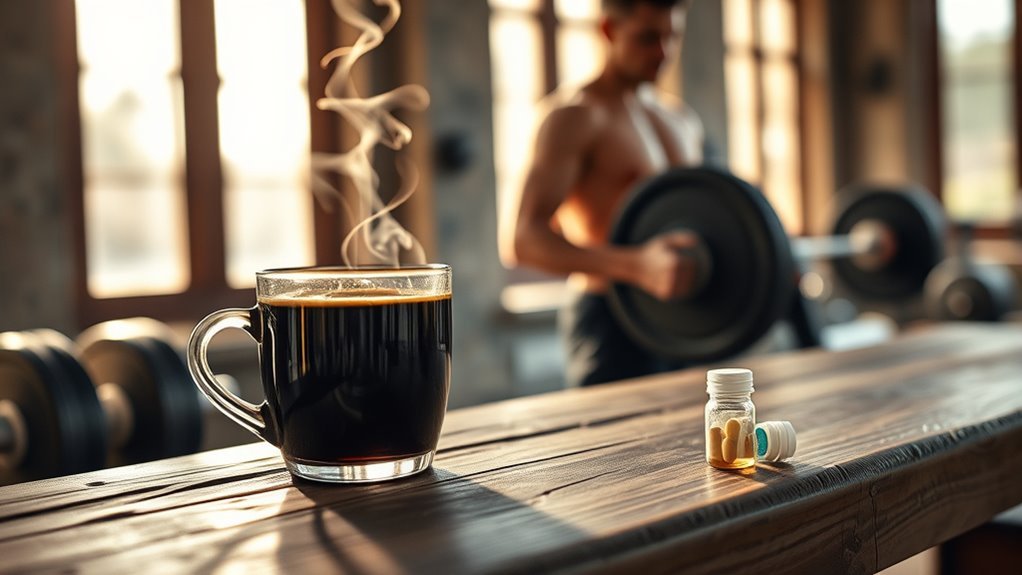The Benefits of Coffee for Weightlifters
Coffee offers weightlifters a range of benefits. It boosts your energy levels, enhances focus, and improves mental clarity during workouts. You’ll find that caffeine increases endurance, helping you lift more effectively. Post-workout, coffee aids muscle recovery by reducing soreness and oxidative stress. Just be mindful of your caffeine intake, as excessive amounts can lead to jitters or digestive issues. Want to discover more about how coffee can enhance your lifting routine?
Enhanced Energy Levels for Optimal Performance

When you’re gearing up for a weightlifting session, having that extra boost in energy can make all the difference in your performance. Caffeine’s timing is essential; consuming it about 30 to 60 minutes before your workout can maximize its effectiveness. Research shows that a dosage of 3 to 6 mg per kilogram of body weight can enhance strength and endurance, allowing you to push harder and lift heavier. This energy boost can lead to improved workout intensity and better overall results. Just be mindful of your own tolerance levels, as excessive caffeine can have negative effects, such as jitters or anxiety. So, find the right balance to harness caffeine’s benefits and take your lifting game to the next level.
Improved Focus and Mental Clarity
In addition to boosting energy levels, caffeine is known for enhancing focus and mental clarity, which can greatly benefit weightlifters during their workouts. By improving cognitive enhancement, caffeine helps you maintain sharp concentration on your form and technique, reducing the risk of injury. When you’re mentally alert, it’s easier to push through tough sets, leading to better workout motivation. Studies show that caffeine can elevate your ability to process information and respond quickly, allowing you to adapt your training strategies on the fly. This heightened mental state not only makes your workouts more effective but also contributes to a more enjoyable experience in the gym. So, consider that cup of coffee as part of your pre-workout routine to maximize your gains.
Increased Endurance During Workouts

While you might not think of coffee as a workout enhancer, its ability to increase endurance during weightlifting sessions is well-documented. By strategically using caffeine, you can push through those last challenging reps. Here’s how to maximize your endurance:
- Caffeine Dosage: Aim for 3-6 mg of caffeine per kilogram of body weight for best results.
- Workout Timing: Consume coffee about 30-60 minutes before your session for peak performance.
- Hydration: Pair your coffee with adequate water intake to prevent dehydration.
- Personal Experimentation: Everyone’s body reacts differently, so find what works best for you.
Better Muscle Recovery Post-Workout
Although many people think of coffee primarily as a stimulant for energy, it can also play a significant role in muscle recovery after intense weightlifting sessions. Consuming coffee post-workout can enhance muscle repair due to its ability to reduce exercise-induced muscle soreness. The caffeine in coffee helps to decrease inflammation, allowing your body to recover more effectively. Additionally, coffee is rich in antioxidant properties, which combat oxidative stress caused by rigorous training. These antioxidants help protect your muscles and tissues, promoting faster recovery. By incorporating coffee into your post-workout routine, you’re not just enjoying a pick-me-up; you’re supporting your body’s natural processes to enhance recovery and improve your overall performance. So, sip away and let your muscles thank you!
Potential Risks and Considerations for Consumption

Even though coffee offers various benefits for weightlifters, it’s important to contemplate potential risks associated with its consumption. Here are some considerations to keep in mind:
- Dehydration Risks: Caffeine can have a diuretic effect, so you may need to increase water intake to stay hydrated.
- Caffeine Sensitivity: Some individuals may experience jitters, anxiety, or sleep disturbances, impacting performance and recovery.
- Overconsumption: Excessive caffeine can lead to increased heart rate or digestive issues, hindering your workout.
- Dependence: Relying on coffee for energy might mask fatigue, preventing you from listening to your body’s needs.
Balancing your coffee intake with these factors can help you enjoy its benefits while minimizing potential downsides. Always consider how your body responds to caffeine.
Frequently Asked Questions
How Much Coffee Should Weightlifters Consume Daily?
Imagine fueling your body like a finely-tuned engine, ready to conquer the weights. When it comes to coffee, there’s no one-size-fits-all answer; it depends on your caffeine tolerance and individual goals. Generally, 3 to 6 mg of caffeine per kilogram of body weight is effective for most. Experiment within this range to find what boosts your performance while keeping you energized and focused. Trust your instincts, and let your body guide you.
Can Coffee Replace Pre-Workout Supplements?
Yes, coffee can effectively replace pre-workout supplements for many. Its caffeine content boosts energy and focus, similar to traditional pre-workout products. Research shows coffee’s effectiveness in enhancing performance and endurance. While there are various caffeine sources available, coffee offers a natural option without the additives found in some supplements. Just remember to monitor your intake to maximize the benefits without overdoing it. Enjoy your workout with a cup of joe!
Is Caffeine Intake Safe for All Weightlifters?
When it comes to caffeine intake for weightlifters, think of it as a double-edged sword. While many can enjoy its benefits, you’ve got to take into account your caffeine sensitivity. Some might find it boosts performance, while others could experience jitters or anxiety. It’s essential to monitor your hydration levels too, as caffeine can lead to dehydration. Always listen to your body and consult a professional if you’re unsure about what’s right for you.
What Time of Day Is Best to Drink Coffee?
The best time to drink coffee often depends on your personal routine. In the morning, coffee can offer significant benefits, boosting your alertness and setting a positive tone for the day. If you’re looking for an afternoon pick-me-up, a cup can provide the needed energy boost without disrupting your sleep later. However, be mindful of your caffeine sensitivity and how it affects your performance. Finding the right balance can enhance your daily productivity.
Are There Specific Coffee Types That Are Better for Weightlifting?
When it comes to choosing your brew, you might find some options more suited to your goals. Espresso, with its concentrated goodness, can provide quick energy and mental clarity, making it a favorite among many. Cold brew, on the other hand, offers smoother flavors and an invigorating lift without the acidity. Both types have their perks, so it’s worth exploring which aligns best with your training rhythm and personal taste.






